Overview
- Brief Narrative
- Lizard skin clutch with a change purse, mirror, and key that Nadzieja Klein took with her when she, her husband, Jerzy, 3 year old daughter, Joanna, and her aunt, Elizawieta Palcew, escaped Warsaw, Poland, after living under German occupation since September 1939. Jerzy had applied for US visas in 1936 following Hitler’s remilitarization of the Rhineland, but was unsuccessful because of restrictive US entry quotas. Jerzy acquired false travel papers for roundtrip travel to Peru via Italy. The family traveled by train to Trieste where they obtained transit permits through Yugoslavia and Greece to Turkey. Up to this point, they had been accompanied by Nadzieja’s brother, wife, and child. But in Istanbul, Nadzieja’s family obtained US visas, valid for 3 months; her brother’s family had not applied previously and continued onto Palestine. Jerzy Klein's family and Elizawieta Palcew were evacuated by the British by train to Baghdad, and then Basra, in Iraq. From there, they sailed to Karachi and Bombay (Mumbai), India, where, in January 1941, they boarded an American cruise liner, the USS President Harrison, and arrived in New York on February 17.
- Date
-
emigration:
1940 April 20-1941 February 17
- Geography
-
received:
Warsaw (Poland)
- Credit Line
- United States Holocaust Memorial Museum Collection, Gift of Joan Kent Finkelstein
- Contributor
-
Subject:
Joan Kent Finkelstein
Subject: Nadine L. Kent
- Biography
-
Joanna Ludmila Klein (later J.L. Kent Finkelstein) was born November 15, 1936, in Warsaw, Poland, to Jerzy and Nadzieja Solomon Klein. Her mother, Nadzieja, born in 1904, was a literary critic and wrote for the liberal weekly Wiadomosci Literackie. Nadzieja received a PhD in 1928 from the University of Warsaw. Her father, Jerzy, born in 1901, was a mechanical engineer and a 1926 graduate of the Polytechnic Institute in Warsaw. As an independent entrepreneur, Jerzy directed such projects as installing sound systems in movie theaters and devised plans for an underground train system in Warsaw. Following Hitler’s remilitarization of the Rhineland in March 1936, Jerzy decided to leave Europe and applied for American visas. He obtained a British immigration visa, but not a work permit, despite previous study and work experience in England.
In September 1939, Germany invaded and occupied Poland. In January 1940, Joanna’s nanny, a Volksdeutsche [ethnic German], returned from a family visit to western Poland and warned the Kleins to leave. They lived in Warsaw on Marszałkowska Street in a building owned by Joanna’s maternal great aunt, Elizawieta Palcew, who had immigrated to Warsaw from Moscow as a young wife. Now a widow, she operated a lucrative shoe factory and kept some of her savings in pre1933 American dollars. The family had also deposited funds with JDC [Joint Distribuion Committee.] Jerzy purchased travel visas and exit permits for round trip travel to Italy via Peru, from the Jewish-owned Orbis travel agency, which obtained them for fifty US dollars each from a corrupt German official in Krakow. The morning they were to receive their documents, Orbis was raided and closed by the Nazis, but the agency’s courier was tipped off about the raid by the non-Jewish doorman, and he personally delivered the permits. Jerzy had arranged to have nine steamer trunks and several suitcases forwarded; all arrived intact in New York.
The Kleins left Warsaw by train immediately, about 20 April 1940, along with four other family members: 74-year-old Elizawieta Palcew, her maternal uncle, Zachar, his wife, Maryla, and their young son, Andrew. Joanna’s paternal grandparents, Herman and Regina (Krykus) Klein stayed to care for Jerzy’s handicapped younger brother; her maternal grandfather, Abraham, and uncle, Leon, also stayed.
Nadzieja had a concealed clothes brush, which Jerzy had hollowed out to hide some family jewels. At one point, while she was using the brush en route, it broke, and they spilled out but were salvaged after Jerzy left the train in Krakow station to rent a hotel room where he was able to repair the brush and return to the train before it left the station.
In Trieste, through the good offices of Fano, a philanthropic Jewish banker from Milan, they obtained transit visas for travel through Yugoslavia and Greece, as well as entry visas into Turkey in June 1940. In Istanbul, Jerzy obtained a job teaching calculus and physics in English at an American school, Robert College, his first encounter with Americans. An official of the Polish Consulate attested that they were “good Polish Catholics” for their applications for Brazilian visas, but then Jerzy, Nadzieja, Joanna, and Elizawieta Palcew obtained visas for America, valid for three months. Zachar and his family, without US visas, decided to immigrate to Palestine. The Kleins and Elizawieta Palcew traveled by train to Baghdad and then to Basra, Iraq, where they boarded a British ship, HMS Varella in December 1940. The ship stopped in Karachi and continued to Bombay (Mumbai), India, where they disembarked. Although Jerzy was offered a job, he was determined to reach the United States. In January 13, 1941, they boarded the USS President Harrison, an American cruise ship, thus legally reaching American soil before the visas expired. They arrived in New York on February 17, 1941, and settled there.
Jerzy’s parents died in Treblinka in 1942. All Jerzy’s family in Poland also perished, including 37 first cousins. Nadzieja’s eldest brother, Leon, died of disease in the Warsaw Ghetto in August 1940, and her father died there of starvation on January 20, 1942. Her brother Zachar and family survived in Palestine.
Upon acquiring United States citizenship in 1946, the family changed their surname from Klein to Kent and Americanized their first names as Nadine, George, and Joan. Joan became a biomedical researcher and teacher, obtaining a PhD in 1963, married, and had two children and three grandchildren. George became the first Jewish engineer at Western Electric (Bell System), where he designed a submarine sonar detection system that aided the war effort and worked in early development of mobile phones; he also taught electrical engineering at the Polytechnic Institute of Brooklyn. Elizawieta Palcew died at age 92 in April 1959. Nadine worked in the Metropolitan Museum of Art, and died on November 25, 1967, age 64 years. George died, age 80 years, in September 1981, while hiking in the Tyrol.
Nadzieja Solomon, later Nadine L. Kent, was born in Warsaw, Poland, on July 28, 1904, to Abraham and Luboff Niurenberg Solomon, the third of four children, with brothers Leon (1897-1940), a physician, Zachar (1901–1970), an engineer, and Anatole (1912-1962+), a banker. She received a doctorate in comparative literature in 1928 from the University of Warsaw, having married Jerzy Klein (b. 1901) in 1926. Their daughter Joanna was born in 1936. Jerzy Klein, later George J. Kent, with a master’s degree in mechanical engineering, was an independent entrepreneurial engineer working on projects such as installing sound systems in movie theaters and designing an underground system for Warsaw. Nadzieja was a foreign book critic, who wrote for the liberal weekly magazine, Literary News [Wiadomości Literackie]. Following Hitler’s remilitarization of the Rhineland in March 1936, Jerzy decided to leave Europe and applied for American visas. He obtained a British visa, but not a work permit, despite previous study and work experience in England.
In September 1939, Germany invaded and occupied Poland. In January 1940, Joanna’s nanny, a Volksdeutsche [ethnic German], returned from a family visit to western Poland and warned the family to leave. They lived in Warsaw on Marszałkowska Street in a building owned by Nadzieja’s aunt, Elizawieta Palcew (1867-1959), who had immigrated to Poland from Moscow as a young wife. Now a widow, she operated a lucrative shoe factory and kept some funds at her home in pre1933 American dollars. The family also had deposited funds with JDC (Joint Distribution Committee). Jerzy purchased travel visas and exit permits for round trip travel to Italy via Peru from the Jewish-owned Orbis travel agency, which obtained them for fifty US dollars each from a corrupt German official in Krakow. The morning they were to receive their documents, Orbis was raided and closed by the Nazis, but the agency’s courier was tipped off about the raid by the non-Jewish doorman, who personally delivered the permits. Jerzy had arranged to have nine steamer trunks and several suitcases forwarded; all arrived intact in New York.
The Kleins left Warsaw by train immediately, about 20 April 1940, along with four other family members: Nadzieja’s aunt, 74-year-old Elizawieta Palcew, her brother, Zachar, his wife, Maryla, and their young son, Andrew. Jerzy’s parents, Herman and Regina Krykus Klein stayed to care for Jerzy’s handicapped younger brother. Nadzieja’s father, Abraham, and brother, Leon, also stayed in Warsaw.
In Trieste, through the good offices of Fano, a philanthropic Jewish banker from Milan, they obtained transit visas for Yugoslavia and Greece, as well as entry visas into Turkey in June 1940. In Istanbul, Jerzy taught calculus and physics in English at an American school, Robert College, his first encounter with Americans. An official at the Polish consulate attested that they were “good Polish Catholics” for their applications for Brazilian visas, but Jerzy, Nadzieja, Joanna, and Elizawieta Palcew obtained visas for America, valid for three months. Zachar and family, without US visas, decided to immigrate to Palestine. The Kleins and Elizawieta Palcew travelled by train to Baghdad and then to Basra in Iraq, where they boarded a British ship, the HMS Varella in December 1940. The ship stopped in Karachi and continued to Bombay (Mumbai), India, where they disembarked. Although Jerzy was offered a job, he was determined to reach the United States. On January 13, 1941, they boarded the USS President Harrison, an American cruise ship, thus legally reaching American soil before the visas expired. They arrived in New York on February 17, 1941, and settled there.
Jerzy’s parents died in Treblinka in 1942. All Jerzy’s family in Poland also perished, including 37 first cousins. Nadzieja’s eldest brother, Leon, died of disease in the Warsaw ghetto in the fall of 1940; her father died there of starvation on January 20, 1942. Her brother, Zachar, and family survived in Palestine/Israel. Her youngest brother, Anatole, survived in Novosibirsk, Siberia, in the Soviet Union.
Upon acquiring United States citizenship in 1946, the family changed their surname from Klein to Kent and Americanized their first names as Nadine, George, and Joan. Nadine worked in the Metropolitan Museum of Art and died on November 25, 1967, age 64. George became the first Jewish engineer at Western Electric (Bell System), where he patented a submarine sonar detection system to help the war effort and worked in the early development of mobile phones. He also taught electrical engineering at the Polytechnic Institute of Brooklyn. Jerzy died, age 81, while hiking in the Italian Tyrol in 1981. Elizawieta Palcew died in April 1959, age 92. Joan became a biomedical researcher and teacher (PhD, 1963), married, and had two children and three grandchildren.
Physical Details
- Classification
-
Dress Accessories
- Category
-
Carried dress accessories
- Object Type
-
Handbags (lcsh)
- Physical Description
- a. Lizard skin brown clutch with a metal fan shaped channel clasp with a brown cloth lining. The metal frame comes to a V at the clasp. A kiss-clasp change purse is attached inside the frame hinge and rotates with it.The interior frame is covered in brown leather.There is an adjustable leather strap, with a metal square loop on 1 side of the exterior.
b. Brown leather change purse with a cloth lining and a gusset pocket. The opening is a curved flap with a metal snap closure.
c. Rectangular mirror with brown cloth backing and a faux leather framed edge. It has a small cloth loop attached to one side.
d. Metal skeleton key. The bow has a decorative clover shape with 4 tiny points on the corners. The shaft of the key is hollow, with 1 tooth, and has a green patina. - Dimensions
- a: Height: 7.875 inches (20.003 cm) | Width: 4.625 inches (11.747 cm) | Depth: 0.700 inches (1.778 cm)
b: Height: 2.250 inches (5.715 cm) | Width: 3.000 inches (7.62 cm)
c: Height: 3.750 inches (9.525 cm) | Width: 2.500 inches (6.35 cm)
d: Height: 1.000 inches (2.54 cm) | Width: 0.500 inches (1.27 cm) - Materials
- a : lizard leather, cloth, metal, glass
b : leather, cloth, metal
c : glass, cloth
d : metal
Rights & Restrictions
- Conditions on Access
- No restrictions on access
- Conditions on Use
- No restrictions on use
Keywords & Subjects
Administrative Notes
- Legal Status
- Permanent Collection
- Provenance
- The clutch, change purse, mirror, and key were donated to the United States Holocaust Memorial Museum in 2009 by Joan Kent Finkelstein, the daughter of George and Nadine Kent.
- Record last modified:
- 2022-07-28 21:51:07
- This page:
- https://collections.ushmm.org/search/catalog/irn41405
Download & Licensing
In-Person Research
- By Appointment
- Request 21 Days in Advance of Visit
- Plan a Research Visit
- Request to See This Object
Contact Us
Also in Joan Kent Finkelstein family collection
The collection consists of artifacts, correspondence, documents, and a photograph album relating to the experiences of Jerzy and Nadzieja Klein, their daughter, Joanna, (from 1946, George, Nadine, and Joan Kent) and their family and friends in Warsaw, Poland, before and during the Holocaust and their immigration to and postwar life in the United States.
Date: 1920-1966
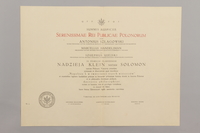
Joan Kent Finkelstein family papers
Document
Consists of correspondence and documents dated between 1940 and 1966 from family and friends of Jerzy and Nadzieja Solomon Klein (later George and Nadine Kent), originally of Warsaw, Poland. Includes correspondence from family who remained in Poland during the war, family who emigrated to Palestine and the Soviet Union, and family and friends who emigrated to the United States, Brazil, and Argentina prior to or during the war. The collection includes translations and explanations of much of the correspondence. Also includes a photograph album containing images from the 1920s and 1930s, largely of holiday and vacation trips throughout Europe and including photos of funeral of Pilsudski, as well as a diploma from the University of Warsaw. Biographical materials include reproductions of identification and immigration papers documenting the family of Jerzy, Nadzieja, and Joanna Klein as well as Nadzieja Solomon Klein’s original 1928 University of Warsaw diploma accompanied by a transcription and translation of the diploma, information about Jewish intellectuals in 1920s Warsaw, and a reproduction of a 1928 photograph of Nadzieja Klein. The correspondence series includes letters, postcards, and telegrams from family who remained in Poland during the war, family who emigrated to Palestine and the Soviet Union, and family and friends who emigrated to the United States, Brazil, and Argentina prior to or during the war. The document titled “Letters to America” by Joan Kent Finkelstein includes translations and explanations of much of the original correspondence. Correspondence from Abraham Solomon, Nadine’s father, relates news from family and friends and the death of Nadine’s brother, Leon (Lowa) in the Warsaw ghetto. Correspondence from Zachar Solomon, Nadine’s brother, provides family news from Palestine, conveys his concerns and fears about his father left in Warsaw and sorrow at his death, describes his work as a Polish engineer attached to the American Army, and documents his efforts to immigrate to the United States and dispose of the family’s property in Poland following the war. Correspondence from Anatole (Tolek) Solomon, Nadine’s brother, describes wartime and postwar life in Siberia and addresses Cold War politics following the Cuban missile crisis. Correspondence from Rafael (Rava) Nurnberg, Nadine’s cousin, documents his efforts to ship food from Argentina to Abraham Solomon in the Warsaw ghetto. Correspondence from Irena Kalecka, a Polish friend of Nadine’s, describes her wartime experiences, the fates of family members and mutual friends, and poor postwar conditions in Poland. Additional correspondents describe wartime and postwar conditions in Poland and Palestine/Israel. The photograph album contains images from the 1920s and 1930s, largely of holiday and vacation trips throughout Europe and to cities such as Hel, Poland and Vienna, Austria, and including photos of the funeral processing honoring Józef Piłsudski.
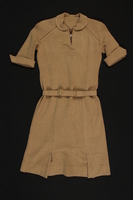
Beige wool/angora dress with self-belt brought to the US by a Jewish family fleeing German occupied Poland
Object
Beige wool/angora dress with matching belt that Nadzieja Klein took with her when she, her husband, Jerzy, 3 year old daughter, Joanna, and her aunt, Elizawieta Palcew, escaped Warsaw, Poland, on April 20, 1940, after living under German occupation since September 1939. Jerzy had applied for US visas in 1936 following Hitler’s remilitarization of the Rhineland, but was unsuccessful because of restrictive US entry quotas. Jerzy acquired false travel papers for roundtrip travel to Peru via Italy. The family traveled by train to Trieste where they obtained transit permits through Yugoslavia and Greece to Turkey. Up to this point, they had been accompanied by Nadzieja’s brother, wife, and child. But in Istanbul, Nadzieja’s family obtained US visas, valid for 3 months; her brother’s family had not applied previously and continued onto Palestine. Jerzy Klein's family and Elizawieta Palcew were evacuated by the British by train to Baghdad, and then Basra, in Iraq. From there, they sailed to Karachi and Bombay (Mumbai), India, where, in January 1941, they boarded an American cruise liner, the USS President Harrison, and arrived in New York on February 17.
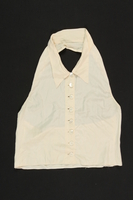
Woman's white silk dickey brought to the US by a Jewish family fleeing German occupied Poland
Object
White silk dickey that Nadzieja Klein took with her when she, her husband, Jerzy, 3 year old daughter, Joanna, and her aunt, Elizawieta Palcew, escaped Warsaw, Poland, after living under German occupation since September 1939. Jerzy had applied for US visas in 1936 following Hitler’s remilitarization of the Rhineland, but was unsuccessful because of restrictive US entry quotas. Jerzy acquired false travel papers for roundtrip travel to Peru via Italy. The family traveled by train to Trieste where they obtained transit permits through Yugoslavia and Greece to Turkey. Up to this point, they had been accompanied by Nadzieja’s brother, wife, and child. But in Istanbul, Nadzieja’s family obtained US visas, valid for 3 months; her brother’s family had not applied previously and continued onto Palestine. Jerzy Klein's family and Elizawieta Palcew were evacuated by the British by train to Baghdad, and then Basra, in Iraq. From there, they sailed to Karachi and Bombay (Mumbai), India, where, in January 1941, they boarded an American cruise liner, the USS President Harrison, and arrived in New York on February 17.
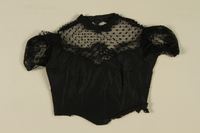
Black silk taffeta bodice with handmade lace brought to the US by a Jewish family fleeing German occupied Poland
Object
Black silk taffeta bodice with handmade floral lace and embroidered appliques detached from a ball gown that Nadzieja Klein took with her when she, her husband, Jerzy, 3 year old daughter, Joanna, and her aunt, Elizawieta Palcew, escaped Warsaw, Poland, after living under German occupation since September 1939. Jerzy had applied for US visas in 1936 following Hitler’s remilitarization of the Rhineland, but was unsuccessful because of restrictive US entry quotas. Jerzy acquired false travel papers for roundtrip travel to Peru via Italy. The family traveled by train to Trieste where they obtained transit permits through Yugoslavia and Greece to Turkey. Up to this point, they had been accompanied by Nadzieja’s brother, wife, and child. But in Istanbul, Nadzieja’s family obtained US visas, valid for 3 months; her brother’s family had not applied previously and continued onto Palestine. Jerzy Klein's family and Elizawieta Palcew were evacuated by the British by train to Baghdad, and then Basra, in Iraq. From there, they sailed to Karachi and Bombay (Mumbai), India, where, in January 1941, they boarded an American cruise liner, the USS President Harrison, and arrived in New York on February 17.
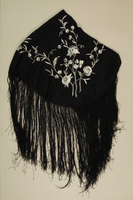
Fringed black silk piano shawl with embroidered silver flowers brought to the US by a Jewish family fleeing German occupied Poland
Object
Embroidered black silk piano shawl that Nadzieja Klein took with her when she, her husband, Jerzy, 3 year old daughter, Joanna, and her aunt, Elizawieta Palcew, escaped Warsaw, Poland, after living under German occupation since September 1939. Jerzy had applied for US visas in 1936 following Hitler’s remilitarization of the Rhineland, but was unsuccessful because of restrictive US entry quotas. Jerzy acquired false travel papers for roundtrip travel to Peru via Italy. The family traveled by train to Trieste where they obtained transit permits through Yugoslavia and Greece to Turkey. Up to this point, they had been accompanied by Nadzieja’s brother, wife, and child. But in Istanbul, Nadzieja’s family obtained US visas, valid for 3 months; her brother’s family had not applied previously and continued onto Palestine. Jerzy Klein's family and Elizawieta Palcew were evacuated by the British by train to Baghdad, and then Basra, in Iraq. From there, they sailed to Karachi and Bombay (Mumbai), India, where, in January 1941, they boarded an American cruise liner, the USS President Harrison, and arrived in New York on February 17.
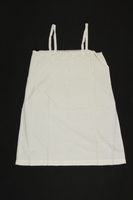
White fine cotton slip with whitework embroidery and an NS monogram brought to the US by a Jewish family fleeing German occupied Poland
Object
Monogrammed fine cotton slip from her 1926 bridal trousseau that Nadzieja Klein took with her when she, her husband, Jerzy, 3 year old daughter, Joanna, and her aunt, Elizawieta Palcew, escaped Warsaw, Poland, after living under German occupation since September 1939. Jerzy had applied for US visas in 1936 following Hitler’s remilitarization of the Rhineland, but was unsuccessful because of restrictive US entry quotas. Jerzy acquired false travel papers for roundtrip travel to Peru via Italy. The family traveled by train to Trieste where they obtained transit permits through Yugoslavia and Greece to Turkey. Up to this point, they had been accompanied by Nadzieja’s brother, wife, and child. But in Istanbul, Nadzieja’s family obtained US visas, valid for 3 months; her brother’s family had not applied previously and continued onto Palestine. Jerzy Klein's family and Elizawieta Palcew were evacuated by the British by train to Baghdad, and then Basra, in Iraq. From there, they sailed to Karachi and Bombay (Mumbai), India, where, in January 1941, they boarded an American cruise liner, the USS President Harrison, and arrived in New York on February 17.
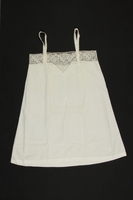
White embroidered fine cotton slip with lace inlay brought to the US by a Jewish family fleeing German occupied Poland
Object
White embroidered fine cotton slip with lace inlay from her 1926 bridal trousseau that Nadzieja Klein took with her when she, her husband, Jerzy, 3 year old daughter, Joanna, and her aunt, Elizawieta Palcew, escaped Warsaw, Poland, after living under German occupation since September 1939. Jerzy had applied for US visas in 1936 following Hitler’s remilitarization of the Rhineland, but was unsuccessful because of restrictive US entry quotas. Jerzy acquired false travel papers for roundtrip travel to Peru via Italy. The family traveled by train to Trieste where they obtained transit permits through Yugoslavia and Greece to Turkey. Up to this point, they had been accompanied by Nadzieja’s brother, wife, and child. But in Istanbul, Nadzieja’s family obtained US visas, valid for 3 months; her brother’s family had not applied previously and continued onto Palestine. Jerzy Klein's family and Elizawieta Palcew were evacuated by the British by train to Baghdad, and then Basra, in Iraq. From there, they sailed to Karachi and Bombay (Mumbai), India, where, in January 1941, they boarded an American cruise liner, the USS President Harrison, and arrived in New York on February 17.
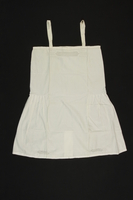
White embroidered cotton slip with an NS monogram and interior flap brought to the US by a Jewish family fleeing German occupied Poland
Object
Monogrammed fine cotton slip with interior flap from her 1926 bridal trousseau that Nadzieja Klein took with her when she, her husband, Jerzy, 3 year old daughter, Joanna, and her aunt, Elizawieta Palcew, escaped Warsaw, Poland, after living under German occupation since September 1939. Jerzy had applied for US visas in 1936 following Hitler’s remilitarization of the Rhineland, but was unsuccessful because of restrictive US entry quotas. Jerzy acquired false travel papers for roundtrip travel to Peru via Italy. The family traveled by train to Trieste where they obtained transit permits through Yugoslavia and Greece to Turkey. Up to this point, they had been accompanied by Nadzieja’s brother, wife, and child. But in Istanbul, Nadzieja’s family obtained US visas, valid for 3 months; her brother’s family had not applied previously and continued onto Palestine. Jerzy Klein's family and Elizawieta Palcew were evacuated by the British by train to Baghdad, and then Basra, in Iraq. From there, they sailed to Karachi and Bombay (Mumbai), India, where, in January 1941, they boarded an American cruise liner, the USS President Harrison, and arrived in New York on February 17.
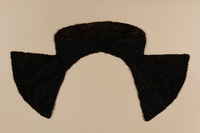
Black fetal horse fur coat collar with black satin lining brought to the US by a Jewish family fleeing German occupied Poland
Object
Black fur coat collar that Nadzieja Klein took with her when she, her husband, Jerzy, 3 year old daughter, Joanna, and her aunt, Elizawieta Palcew, escaped Warsaw, Poland, after living under German occupation since September 1939. Jerzy had applied for US visas in 1936 following Hitler’s remilitarization of the Rhineland, but was unsuccessful because of restrictive US entry quotas. Jerzy acquired false travel papers for roundtrip travel to Peru via Italy. The family traveled by train to Trieste where they obtained transit permits through Yugoslavia and Greece to Turkey. Up to this point, they had been accompanied by Nadzieja’s brother, wife, and child. But in Istanbul, Nadzieja’s family obtained US visas, valid for 3 months; her brother’s family had not applied previously and continued onto Palestine. Jerzy Klein's family and Elizawieta Palcew were evacuated by the British by train to Baghdad, and then Basra, in Iraq. From there, they sailed to Karachi and Bombay (Mumbai), India, where, in January 1941, they boarded an American cruise liner, the USS President Harrison, and arrived in New York on February 17.
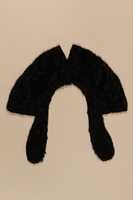
Black fetal horse fur coat collar with tear drop ends brought to the US by a Jewish family fleeing German occupied Poland
Object
Black fur coat collar with tear drop ends that Nadzieja Klein took with her when she, her husband, Jerzy, 3 year old daughter, Joanna, and her aunt, Elizawieta Palcew, escaped Warsaw, Poland, after living under German occupation since September 1939. Jerzy had applied for US visas in 1936 following Hitler’s remilitarization of the Rhineland, but was unsuccessful because of restrictive US entry quotas. Jerzy acquired false travel papers for roundtrip travel to Peru via Italy. The family traveled by train to Trieste where they obtained transit permits through Yugoslavia and Greece to Turkey. Up to this point, they had been accompanied by Nadzieja’s brother, wife, and child. But in Istanbul, Nadzieja’s family obtained US visas, valid for 3 months; her brother’s family had not applied previously and continued onto Palestine. Jerzy Klein's family and Elizawieta Palcew were evacuated by the British by train to Baghdad, and then Basra, in Iraq. From there, they sailed to Karachi and Bombay (Mumbai), India, where, in January 1941, they boarded an American cruise liner, the USS President Harrison, and arrived in New York on February 17.
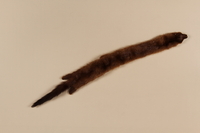
Red and brown fox fur wrap brought to the US by a Jewish family fleeing German occupied Poland
Object
Brown fox fur neck piece that Nadzieja Klein took with her when she, her husband, Jerzy, 3 year old daughter, Joanna, and her aunt, Elizawieta Palcew, escaped Warsaw, Poland, after living under German occupation since September 1939. Jerzy had applied for US visas in 1936 following Hitler’s remilitarization of the Rhineland, but was unsuccessful because of restrictive US entry quotas. Jerzy acquired false travel papers for roundtrip travel to Peru via Italy. The family traveled by train to Trieste where they obtained transit permits through Yugoslavia and Greece to Turkey. Up to this point, they had been accompanied by Nadzieja’s brother, wife, and child. But in Istanbul, Nadzieja’s family obtained US visas, valid for 3 months; her brother’s family had not applied previously and continued onto Palestine. Jerzy Klein's family and Elizawieta Palcew were evacuated by the British by train to Baghdad, and then Basra, in Iraq. From there, they sailed to Karachi and Bombay (Mumbai), India, where, in January 1941, they boarded an American cruise liner, the USS President Harrison, and arrived in New York on February 17.
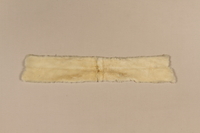
White rabbit fur collar brought to the US by a Jewish family fleeing German occupied Poland
Object
White rabbit fur collar that Nadzieja Klein took with her when she, her husband, Jerzy, 3 year old daughter, Joanna, and her aunt, Elizawieta Palcew, escaped Warsaw, Poland, after living under German occupation since September 1939. Jerzy had applied for US visas in 1936 following Hitler’s remilitarization of the Rhineland, but was unsuccessful because of restrictive US entry quotas. Jerzy acquired false travel papers for roundtrip travel to Peru via Italy. The family traveled by train to Trieste where they obtained transit permits through Yugoslavia and Greece to Turkey. Up to this point, they had been accompanied by Nadzieja’s brother, wife, and child. But in Istanbul, Nadzieja’s family obtained US visas, valid for 3 months; her brother’s family had not applied previously and continued onto Palestine. Jerzy Klein's family and Elizawieta Palcew were evacuated by the British by train to Baghdad, and then Basra, in Iraq. From there, they sailed to Karachi and Bombay (Mumbai), India, where, in January 1941, they boarded an American cruise liner, the USS President Harrison, and arrived in New York on February 17.
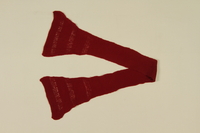
Handknit red wool scarf brought to the US by a Jewish family fleeing German occupied Poland
Object
Red wool handknit scarf that Nadzieja Klein took with her when she, her husband, Jerzy, 3 year old daughter, Joanna, and her aunt, Elizawieta Palcew, escaped Warsaw, Poland, after living under German occupation since September 1939. Jerzy had applied for US visas in 1936 following Hitler’s remilitarization of the Rhineland, but was unsuccessful because of restrictive US entry quotas. Jerzy acquired false travel papers for roundtrip travel to Peru via Italy. The family traveled by train to Trieste where they obtained transit permits through Yugoslavia and Greece to Turkey. Up to this point, they had been accompanied by Nadzieja’s brother, wife, and child. But in Istanbul, Nadzieja’s family obtained US visas, valid for 3 months; her brother’s family had not applied previously and continued onto Palestine. Jerzy Klein's family and Elizawieta Palcew were evacuated by the British by train to Baghdad, and then Basra, in Iraq. From there, they sailed to Karachi and Bombay (Mumbai), India, where, in January 1941, they boarded an American cruise liner, the USS President Harrison, and arrived in New York on February 17.
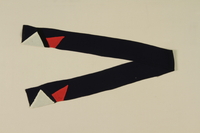
Woven navy blue wool scarf with red and white accents brought to the US by Nadzieja Klein's family
Object
Woven, navy blue wool scarf with red and white accents that Nadzieja Klein took with her when she, her husband, Jerzy, 3 year old daughter, Joanna, and her aunt, Elizawieta Palcew, escaped Warsaw, Poland, after living under German occupation since September 1939. Jerzy had applied for US visas in 1936 following Hitler’s remilitarization of the Rhineland, but was unsuccessful because of restrictive US entry quotas. Jerzy acquired false travel papers for roundtrip travel to Peru via Italy. The family traveled by train to Trieste where they obtained transit permits through Yugoslavia and Greece to Turkey. Up to this point, they had been accompanied by Nadzieja’s brother, wife, and child. But in Istanbul, Nadzieja’s family obtained US visas, valid for 3 months; her brother’s family had not applied previously and continued onto Palestine. Jerzy Klein's family and Elizawieta Palcew were evacuated by the British by train to Baghdad, and then Basra, in Iraq. From there, they sailed to Karachi and Bombay (Mumbai), India, where, in January 1941, they boarded an American cruise liner, the USS President Harrison, and arrived in New York on February 17.
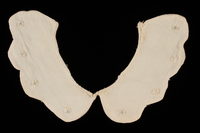
Child's cotton twill collar with embroidered daisies brought to the US by a Jewish family fleeing German occupied Poland
Object
Child's detachable cotton twill collar with embroidered daisies that belonged to 3 year old Joanna Klein when she, her parents, Nadzieja and Jerzy, and her great-aunt, Elizawieta Palcew, escaped Warsaw, Poland, after living under German occupation since September 1939. Jerzy had applied for US visas in 1936 following Hitler’s remilitarization of the Rhineland, but was unsuccessful because of restrictive US entry quotas. Jerzy acquired false travel papers for roundtrip travel to Peru via Italy. The family traveled by train to Trieste where they obtained transit permits through Yugoslavia and Greece to Turkey. Up to this point, they had been accompanied by Nadzieja’s brother, wife, and child. But in Istanbul, Nadzieja’s family obtained US visas, valid for 3 months; her brother’s family had not applied previously and continued onto Palestine. Jerzy Klein's family and Elizawieta Palcew were evacuated by the British by train to Baghdad, and then Basra, in Iraq. From there, they sailed to Karachi and Bombay (Mumbai), India, where, in January 1941, they boarded an American cruise liner, the USS President Harrison, and arrived in New York on February 17.
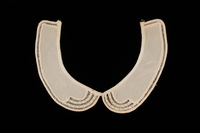
Child's silk Peter Pan collar with embroidered blue dots brought to the US by a Jewish family fleeing German occupied Poland
Object
Child's detachable silk collar with embroidered blue dots that belonged to 3 year old Joanna Klein when she, her parents, Nadzieja and Jerzy, and her great-aunt, Elizawieta Palcew, escaped Warsaw, Poland, after living under German occupation since September 1939. Jerzy had applied for US visas in 1936 following Hitler’s remilitarization of the Rhineland, but was unsuccessful because of restrictive US entry quotas. Jerzy acquired false travel papers for roundtrip travel to Peru via Italy. The family traveled by train to Trieste where they obtained transit permits through Yugoslavia and Greece to Turkey. Up to this point, they had been accompanied by Nadzieja’s brother, wife, and child. But in Istanbul, Nadzieja’s family obtained US visas, valid for 3 months; her brother’s family had not applied previously and continued onto Palestine. Jerzy Klein's family and Elizawieta Palcew were evacuated by the British by train to Baghdad, and then Basra, in Iraq. From there, they sailed to Karachi and Bombay (Mumbai), India, where, in January 1941, they boarded an American cruise liner, the USS President Harrison, and arrived in New York on February 17.
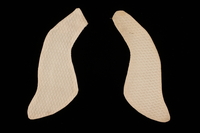
Child’s diamond patterned collar set brought to the US by a Jewish family fleeing German occupied Poland
Object
Child’s diamond patterned dog ear collar in 2 sections that belonged to 3 year old Joanna Klein when she, her parents, Nadzieja and Jerzy, and her great-aunt, Elizawieta Palcew, escaped Warsaw, Poland, after living under German occupation since September 1939. Jerzy had applied for US visas in 1936 following Hitler’s remilitarization of the Rhineland, but was unsuccessful because of restrictive US entry quotas. Jerzy acquired false travel papers for roundtrip travel to Peru via Italy. The family traveled by train to Trieste where they obtained transit permits through Yugoslavia and Greece to Turkey. Up to this point, they had been accompanied by Nadzieja’s brother, wife, and child. But in Istanbul, Nadzieja’s family obtained US visas, valid for 3 months; her brother’s family had not applied previously and continued onto Palestine. Jerzy Klein's family and Elizawieta Palcew were evacuated by the British by train to Baghdad, and then Basra, in Iraq. From there, they sailed to Karachi and Bombay (Mumbai), India, where, in January 1941, they boarded an American cruise liner, the USS President Harrison, and arrived in New York on February 17.
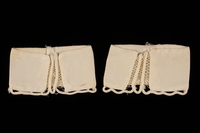
Two white silk sleeve cuffs with scalloped cording brought to the US by a Jewish family fleeing German occupied Poland
Object
Pair of detached white silk sleeve cuffs that Nadzieja Klein took with her when she, her husband, Jerzy, 3 year old daughter, Joanna, and her aunt, Elizawieta Palcew, escaped Warsaw, Poland, after living under German occupation since September 1939. Jerzy had applied for US visas in 1936 following Hitler’s remilitarization of the Rhineland, but was unsuccessful because of restrictive US entry quotas. Jerzy acquired false travel papers for roundtrip travel to Peru via Italy. The family traveled by train to Trieste where they obtained transit permits through Yugoslavia and Greece to Turkey. Up to this point, they had been accompanied by Nadzieja’s brother, wife, and child. But in Istanbul, Nadzieja’s family obtained US visas, valid for 3 months; her brother’s family had not applied previously and continued onto Palestine. Jerzy Klein's family and Elizawieta Palcew were evacuated by the British by train to Baghdad, and then Basra, in Iraq. From there, they sailed to Karachi and Bombay (Mumbai), India, where, in January 1941, they boarded an American cruise liner, the USS President Harrison, and arrived in New York on February 17.
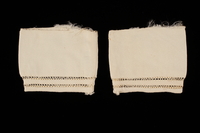
Two white silk sleeve cuffs with stitched whitework borders brought to the US by a Jewish family fleeing German occupied Poland
Object
Pair of detached embroidered white silk sleeve cuffs that Nadzieja Klein took with her when she, her husband, Jerzy, 3 year old daughter, Joanna, and her aunt, Elizawieta Palcew, escaped Warsaw, Poland, after living under German occupation since September 1939. Jerzy had applied for US visas in 1936 following Hitler’s remilitarization of the Rhineland, but was unsuccessful because of restrictive US entry quotas. Jerzy acquired false travel papers for roundtrip travel to Peru via Italy. The family traveled by train to Trieste where they obtained transit permits through Yugoslavia and Greece to Turkey. Up to this point, they had been accompanied by Nadzieja’s brother, wife, and child. But in Istanbul, Nadzieja’s family obtained US visas, valid for 3 months; her brother’s family had not applied previously and continued onto Palestine. Jerzy Klein's family and Elizawieta Palcew were evacuated by the British by train to Baghdad, and then Basra, in Iraq. From there, they sailed to Karachi and Bombay (Mumbai), India, where, in January 1941, they boarded an American cruise liner, the USS President Harrison, and arrived in New York on February 17.
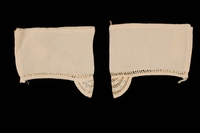
Two white silk sleeve cuffs with semicircular stitched accents with blue dots brought to the US by a Jewish family fleeing German occupied Poland
Object
Pair of detached white silk sleeve cuffs with embroidered semicircular accents that Nadzieja Klein took with her when she, her husband, Jerzy, 3 year old daughter, Joanna, and her aunt, Elizawieta Palcew, escaped Warsaw, Poland, after living under German occupation since September 1939. Jerzy had applied for US visas in 1936 following Hitler’s remilitarization of the Rhineland, but was unsuccessful because of restrictive US entry quotas. Jerzy acquired false travel papers for roundtrip travel to Peru via Italy. The family traveled by train to Trieste where they obtained transit permits through Yugoslavia and Greece to Turkey. Up to this point, they had been accompanied by Nadzieja’s brother, wife, and child. But in Istanbul, Nadzieja’s family obtained US visas, valid for 3 months; her brother’s family had not applied previously and continued onto Palestine. Jerzy Klein's family and Elizawieta Palcew were evacuated by the British by train to Baghdad, and then Basra, in Iraq. From there, they sailed to Karachi and Bombay (Mumbai), India, where, in January 1941, they boarded an American cruise liner, the USS President Harrison, and arrived in New York on February 17.
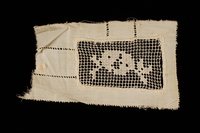
Four white filet embroidered net inserts brought to the US by a Jewish family fleeing German occupied Poland
Object
Four decorative filet embroidered net cloth inserts that Nadzieja Klein took with her when she, her husband, Jerzy, 3 year old daughter, Joanna, and her aunt, Elizawieta Palcew, escaped Warsaw, Poland, after living under German occupation since September 1939. Jerzy had applied for US visas in 1936 following Hitler’s remilitarization of the Rhineland, but was unsuccessful because of restrictive US entry quotas. Jerzy acquired false travel papers for roundtrip travel to Peru via Italy. The family traveled by train to Trieste where they obtained transit permits through Yugoslavia and Greece to Turkey. Up to this point, they had been accompanied by Nadzieja’s brother, wife, and child. But in Istanbul, Nadzieja’s family obtained US visas, valid for 3 months; her brother’s family had not applied previously and continued onto Palestine. Jerzy Klein's family and Elizawieta Palcew were evacuated by the British by train to Baghdad, and then Basra, in Iraq. From there, they sailed to Karachi and Bombay (Mumbai), India, where, in January 1941, they boarded an American cruise liner, the USS President Harrison, and arrived in New York on February 17.
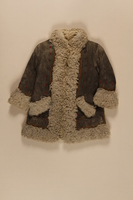
Child's gray shearling embroidered mountaineer's craft coat brought to the US by a Jewish family fleeing German occupied Poland
Object
Child's gray shearling embroidered mountaineer's craft coat purchased in 1939 for 3 year old Joanna Klein. The next year, on April 20, 1940, Joanna, her parents, Nadzieja and Jerzy, and her great-aunt, Elizawieta Palcew, escaped Warsaw, Poland, after living under German occupation since September 1939. Jerzy had applied for US visas in 1936 following Hitler’s remilitarization of the Rhineland, but was unsuccessful because of restrictive US entry quotas. Jerzy acquired false travel papers for roundtrip travel to Peru via Italy. The family traveled by train to Trieste where they obtained transit permits through Yugoslavia and Greece to Turkey. Up to this point, they had been accompanied by Nadzieja’s brother, wife, and child. But in Istanbul, Nadzieja’s family obtained US visas, valid for 3 months; her brother’s family had not applied previously and continued onto Palestine. Jerzy Klein's family and Elizawieta Palcew were evacuated by the British by train to Baghdad, and then Basra, in Iraq. From there, they sailed to Karachi and Bombay (Mumbai), India, where, in January 1941, they boarded an American cruise liner, the USS President Harrison, and arrived in New York on February 17.
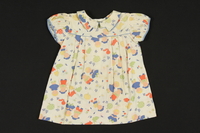
Child's colorful print cotton dress with blue piping brought to the US by a Jewish family fleeing German occupied Poland
Object
Child’s white cotton dress with colorful designs of small children and animals that belonged to 3 year old Joanna Klein when she, her parents, Nadzieja and Jerzy, and her great-aunt, Elizawieta Palcew, escaped Warsaw, Poland, after living under German occupation since September 1939. Jerzy had applied for US visas in 1936 following Hitler’s remilitarization of the Rhineland, but was unsuccessful because of restrictive US entry quotas. Jerzy acquired false travel papers for roundtrip travel to Peru via Italy. The family traveled by train to Trieste where they obtained transit permits through Yugoslavia and Greece to Turkey. Up to this point, they had been accompanied by Nadzieja’s brother, wife, and child. But in Istanbul, Nadzieja’s family obtained US visas, valid for 3 months; her brother’s family had not applied previously and continued onto Palestine. Jerzy Klein's family and Elizawieta Palcew were evacuated by the British by train to Baghdad, and then Basra, in Iraq. From there, they sailed to Karachi and Bombay (Mumbai), India, where, in January 1941, they boarded an American cruise liner, the USS President Harrison, and arrived in New York on February 17.
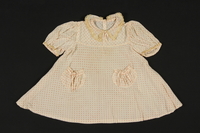
Child's peach silk polka dot dress brought to the US by a Jewish family fleeing German occupied Poland
Object
Child’s peach silk polka dot dress that belonged to 3 year old Joanna Klein when she, her parents, Nadzieja and Jerzy, and her great-aunt, Elizawieta Palcew, escaped Warsaw, Poland, after living under German occupation since September 1939. Jerzy had applied for US visas in 1936 following Hitler’s remilitarization of the Rhineland, but was unsuccessful because of restrictive US entry quotas. Jerzy acquired false travel papers for roundtrip travel to Peru via Italy. The family traveled by train to Trieste where they obtained transit permits through Yugoslavia and Greece to Turkey. Up to this point, they had been accompanied by Nadzieja’s brother, wife, and child. But in Istanbul, Nadzieja’s family obtained US visas, valid for 3 months; her brother’s family had not applied previously and continued onto Palestine. Jerzy Klein's family and Elizawieta Palcew were evacuated by the British by train to Baghdad, and then Basra, in Iraq. From there, they sailed to Karachi and Bombay (Mumbai), India, where, in January 1941, they boarded an American cruise liner, the USS President Harrison, and arrived in New York on February 17.
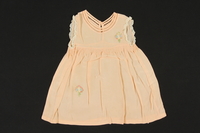
Child's peach silk sleeveless dress with embroidered flowers brought to the US by a Jewish family fleeing German occupied Poland
Object
Child’s sleeveless peach silk embroidered dress that belonged to 3 year old Joanna Klein when she, her parents, Nadzieja and Jerzy, and her great-aunt, Elizawieta Palcew, escaped Warsaw, Poland, after living under German occupation since September 1939. Jerzy had applied for US visas in 1936 following Hitler’s remilitarization of the Rhineland, but was unsuccessful because of restrictive US entry quotas. Jerzy acquired false travel papers for roundtrip travel to Peru via Italy. The family traveled by train to Trieste where they obtained transit permits through Yugoslavia and Greece to Turkey. Up to this point, they had been accompanied by Nadzieja’s brother, wife, and child. But in Istanbul, Nadzieja’s family obtained US visas, valid for 3 months; her brother’s family had not applied previously and continued onto Palestine. Jerzy Klein's family and Elizawieta Palcew were evacuated by the British by train to Baghdad, and then Basra, in Iraq. From there, they sailed to Karachi and Bombay (Mumbai), India, where, in January 1941, they boarded an American cruise liner, the USS President Harrison, and arrived in New York on February 17.
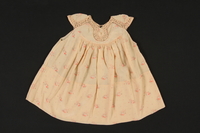
Child's pink silk cabbage rose patterned dress brought to the US by a Jewish family fleeing German occupied Poland
Object
Child's pink silk dress with a lace neckline that belonged to 3 year old Joanna Klein when she, her parents, Nadzieja and Jerzy, and her great-aunt, Elizawieta Palcew, escaped Warsaw, Poland, after living under German occupation since September 1939. Jerzy had applied for US visas in 1936 following Hitler’s remilitarization of the Rhineland, but was unsuccessful because of restrictive US entry quotas. Jerzy acquired false travel papers for roundtrip travel to Peru via Italy. The family traveled by train to Trieste where they obtained transit permits through Yugoslavia and Greece to Turkey. Up to this point, they had been accompanied by Nadzieja’s brother, wife, and child. But in Istanbul, Nadzieja’s family obtained US visas, valid for 3 months; her brother’s family had not applied previously and continued onto Palestine. Jerzy Klein's family and Elizawieta Palcew were evacuated by the British by train to Baghdad, and then Basra, in Iraq. From there, they sailed to Karachi and Bombay (Mumbai), India, where, in January 1941, they boarded an American cruise liner, the USS President Harrison, and arrived in New York on February 17.
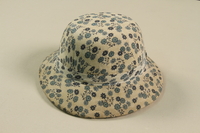
Child's pith helmet acquired in India during the journey to the US by a Jewish family fleeing German occupied Poland
Object
Child’s flower patterned pith helmet acquired in India for 3 year old Joanna Klein in January 1941 during the long journey to the United States after she, her parents, Nadzieja and Jerzy, and her great-aunt, Elizawieta Palcew, escaped Warsaw, Poland, after living under German occupation since September 1939. Jerzy had applied for US visas in 1936 following Hitler’s remilitarization of the Rhineland, but was unsuccessful because of restrictive US entry quotas. Jerzy acquired false travel papers for roundtrip travel to Peru via Italy. The family traveled by train to Trieste where they obtained transit permits through Yugoslavia and Greece to Turkey. Up to this point, they had been accompanied by Nadzieja’s brother, wife, and child. But in Istanbul, Nadzieja’s family obtained US visas, valid for 3 months; her brother’s family had not applied previously and continued onto Palestine. Jerzy Klein's family and Elizawieta Palcew were evacuated by the British by train to Baghdad, and then Basra, in Iraq. From there, they sailed to Karachi and Bombay (Mumbai), India, where, in January 1941, they boarded an American cruise liner, the USS President Harrison, and arrived in New York on February 17.
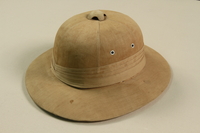
Adult's pith helmet acquired in India during the journey to the US by a Jewish family fleeing German occupied Poland
Object
Pith helmet acquired by Jerzy Klein in January 1941 during the long journey to the United States after he, his wife, Nadzieja, 3 year old daughter, Joanna, and Nadzieja's aunt, Elizawieta Palcew, escaped Warsaw, Poland, after living under German occupation since September 1939. Jerzy had applied for US visas in 1936 following Hitler’s remilitarization of the Rhineland, but was unsuccessful because of restrictive US entry quotas. Jerzy acquired false travel papers for roundtrip travel to Peru via Italy. The family traveled by train to Trieste where they obtained transit permits through Yugoslavia and Greece to Turkey. Up to this point, they had been accompanied by Nadzieja’s brother, wife, and child. But in Istanbul, Nadzieja’s family obtained US visas, valid for 3 months; her brother’s family had not applied previously and continued onto Palestine. Jerzy Klein's family and Elizawieta Palcew were evacuated by the British by train to Baghdad, and then Basra, in Iraq. From there, they sailed to Karachi and Bombay (Mumbai), India, where, in January 1941, they boarded an American cruise liner, the USS President Harrison, and arrived in New York on February 17.
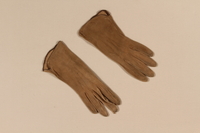
Pair of woman's fawn and tan suede gloves brought to the US by a Jewish family fleeing German occupied Poland
Object
Two fawn and tan suede gloves that Nadzieja Klein took with her when she, her husband, Jerzy, 3 year old daughter, Joanna, and her aunt, Elizawieta Palcew, escaped Warsaw, Poland, after living under German occupation since September 1939. Jerzy had applied for US visas in 1936 following Hitler’s remilitarization of the Rhineland, but was unsuccessful because of restrictive US entry quotas. Jerzy acquired false travel papers for roundtrip travel to Peru via Italy. The family traveled by train to Trieste where they obtained transit permits through Yugoslavia and Greece to Turkey. Up to this point, they had been accompanied by Nadzieja’s brother, wife, and child. But in Istanbul, Nadzieja’s family obtained US visas, valid for 3 months; her brother’s family had not applied previously and continued onto Palestine. Jerzy Klein's family and Elizawieta Palcew were evacuated by the British by train to Baghdad, and then Basra, in Iraq. From there, they sailed to Karachi and Bombay (Mumbai), India, where, in January 1941, they boarded an American cruise liner, the USS President Harrison, and arrived in New York on February 17.
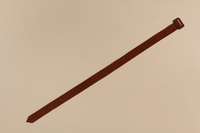
Woman’s brown suede belt brought to the US by a Jewish family fleeing German occupied Poland
Object
Brown suede belt that Nadzieja Klein took with her when she, her husband, Jerzy, 3 year old daughter, Joanna, and her aunt, Elizawieta Palcew, escaped Warsaw, Poland, after living under German occupation since September 1939. Jerzy had applied for US visas in 1936 following Hitler’s remilitarization of the Rhineland, but was unsuccessful because of restrictive US entry quotas. Jerzy acquired false travel papers for roundtrip travel to Peru via Italy. The family traveled by train to Trieste where they obtained transit permits through Yugoslavia and Greece to Turkey. Up to this point, they had been accompanied by Nadzieja’s brother, wife, and child. But in Istanbul, Nadzieja’s family obtained US visas, valid for 3 months; her brother’s family had not applied previously and continued onto Palestine. Jerzy Klein's family and Elizawieta Palcew were evacuated by the British by train to Baghdad, and then Basra, in Iraq. From there, they sailed to Karachi and Bombay (Mumbai), India, where, in January 1941, they boarded an American cruise liner, the USS President Harrison, and arrived in New York on February 17.
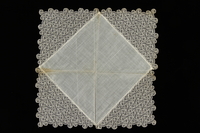
Lace bordered white handkerchief brought to the US by a Jewish family fleeing German occupied Poland
Object
Lace bordered white handkerchief that Nadzieja Klein took with her when she, her husband, Jerzy, 3 year old daughter, Joanna, and her aunt, Elizawieta Palcew, escaped Warsaw, Poland, after living under German occupation since September 1939. Jerzy had applied for US visas in 1936 following Hitler’s remilitarization of the Rhineland, but was unsuccessful because of restrictive US entry quotas. Jerzy acquired false travel papers for roundtrip travel to Peru via Italy. The family traveled by train to Trieste where they obtained transit permits through Yugoslavia and Greece to Turkey. Up to this point, they had been accompanied by Nadzieja’s brother, wife, and child. But in Istanbul, Nadzieja’s family obtained US visas, valid for 3 months; her brother’s family had not applied previously and continued onto Palestine. Jerzy Klein's family and Elizawieta Palcew were evacuated by the British by train to Baghdad, and then Basra, in Iraq. From there, they sailed to Karachi and Bombay (Mumbai), India, where, in January 1941, they boarded an American cruise liner, the USS President Harrison, and arrived in New York on February 17.
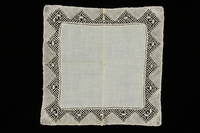
White handkerchief with an embroidered triangle patterned border brought to the US by a Jewish family fleeing German occupied Poland
Object
White handkerchief with a border of triangle patterned whitework that Nadzieja Klein took with her when she, her husband, Jerzy, 3 year old daughter, Joanna, and her aunt, Elizawieta Palcew, escaped Warsaw, Poland, after living under German occupation since September 1939. Jerzy had applied for US visas in 1936 following Hitler’s remilitarization of the Rhineland, but was unsuccessful because of restrictive US entry quotas. Jerzy acquired false travel papers for roundtrip travel to Peru via Italy. The family traveled by train to Trieste where they obtained transit permits through Yugoslavia and Greece to Turkey. Up to this point, they had been accompanied by Nadzieja’s brother, wife, and child. But in Istanbul, Nadzieja’s family obtained US visas, valid for 3 months; her brother’s family had not applied previously and continued onto Palestine. Jerzy Klein's family and Elizawieta Palcew were evacuated by the British by train to Baghdad, and then Basra, in Iraq. From there, they sailed to Karachi and Bombay (Mumbai), India, where, in January 1941, they boarded an American cruise liner, the USS President Harrison, and arrived in New York on February 17.
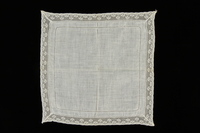
White cotton lace handkerchief with a floral motif lace border brought to the US by a Jewish family fleeing German occupied Poland
Object
White cotton floral lace bordered handkerchief that Nadzieja Klein took with her when she, her husband, Jerzy, 3 year old daughter, Joanna, and her aunt, Elizawieta Palcew, escaped Warsaw, Poland, after living under German occupation since September 1939. Jerzy had applied for US visas in 1936 following Hitler’s remilitarization of the Rhineland, but was unsuccessful because of restrictive US entry quotas. Jerzy acquired false travel papers for roundtrip travel to Peru via Italy. The family traveled by train to Trieste where they obtained transit permits through Yugoslavia and Greece to Turkey. Up to this point, they had been accompanied by Nadzieja’s brother, wife, and child. But in Istanbul, Nadzieja’s family obtained US visas, valid for 3 months; her brother’s family had not applied previously and continued onto Palestine. Jerzy Klein's family and Elizawieta Palcew were evacuated by the British by train to Baghdad, and then Basra, in Iraq. From there, they sailed to Karachi and Bombay (Mumbai), India, where, in January 1941, they boarded an American cruise liner, the USS President Harrison, and arrived in New York on February 17.
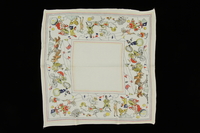
Silk circus print handkerchief brought to the US by a Jewish family fleeing German occupied Poland
Object
White silk handkerchief with a colorful circus design that Nadzieja Klein took with her when she, her husband, Jerzy, 3 year old daughter, Joanna, and her aunt, Elizawieta Palcew, escaped Warsaw, Poland, after living under German occupation since September 1939. Jerzy had applied for US visas in 1936 following Hitler’s remilitarization of the Rhineland, but was unsuccessful because of restrictive US entry quotas. Jerzy acquired false travel papers for roundtrip travel to Peru via Italy. The family traveled by train to Trieste where they obtained transit permits through Yugoslavia and Greece to Turkey. Up to this point, they had been accompanied by Nadzieja’s brother, wife, and child. But in Istanbul, Nadzieja’s family obtained US visas, valid for 3 months; her brother’s family had not applied previously and continued onto Palestine. Jerzy Klein's family and Elizawieta Palcew were evacuated by the British by train to Baghdad, and then Basra, in Iraq. From there, they sailed to Karachi and Bombay (Mumbai), India, where, in January 1941, they boarded an American cruise liner, the USS President Harrison, and arrived in New York on February 17.
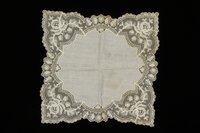
White silk handkerchief with handmade floral lace design brought to the US by a Jewish family fleeing German occupied Poland
Object
White silk handkerchief with floral lace that Nadzieja Klein took with her when she, her husband, Jerzy, 3 year old daughter, Joanna, and her aunt, Elizawieta Palcew, escaped Warsaw, Poland, after living under German occupation since September 1939. Jerzy had applied for US visas in 1936 following Hitler’s remilitarization of the Rhineland, but was unsuccessful because of restrictive US entry quotas. Jerzy acquired false travel papers for roundtrip travel to Peru via Italy. The family traveled by train to Trieste where they obtained transit permits through Yugoslavia and Greece to Turkey. Up to this point, they had been accompanied by Nadzieja’s brother, wife, and child. But in Istanbul, Nadzieja’s family obtained US visas, valid for 3 months; her brother’s family had not applied previously and continued onto Palestine. Jerzy Klein's family and Elizawieta Palcew were evacuated by the British by train to Baghdad, and then Basra, in Iraq. From there, they sailed to Karachi and Bombay (Mumbai), India, where, in January 1941, they boarded an American cruise liner, the USS President Harrison, and arrived in New York on February 17.
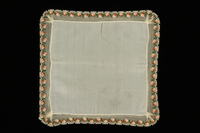
White silk handkerchief bordered with lace and pink flowers brought to the US by a Jewish family fleeing German occupied Poland
Object
White silk handkerchief with an embroidered pink flowered border that Nadzieja Klein took with her when she, her husband, Jerzy, 3 year old daughter, Joanna, and her aunt, Elizawieta Palcew, escaped Warsaw, Poland, after living under German occupation since September 1939. Jerzy had applied for US visas in 1936 following Hitler’s remilitarization of the Rhineland, but was unsuccessful because of restrictive US entry quotas. Jerzy acquired false travel papers for roundtrip travel to Peru via Italy. The family traveled by train to Trieste where they obtained transit permits through Yugoslavia and Greece to Turkey. Up to this point, they had been accompanied by Nadzieja’s brother, wife, and child. But in Istanbul, Nadzieja’s family obtained US visas, valid for 3 months; her brother’s family had not applied previously and continued onto Palestine. Jerzy Klein's family and Elizawieta Palcew were evacuated by the British by train to Baghdad, and then Basra, in Iraq. From there, they sailed to Karachi and Bombay (Mumbai), India, where, in January 1941, they boarded an American cruise liner, the USS President Harrison, and arrived in New York on February 17.
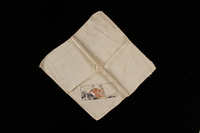
White silk handkerchief with a drawing of 2 women on horseback brought to the US by a Jewish family fleeing German occupied Poland
Object
White silk handkerchief with a small drawing of horseback riders that Nadzieja Klein took with her when she, her husband, Jerzy, 3 year old daughter, Joanna, and her aunt, Elizawieta Palcew, escaped Warsaw, Poland, after living under German occupation since September 1939. Jerzy had applied for US visas in 1936 following Hitler’s remilitarization of the Rhineland, but was unsuccessful because of restrictive US entry quotas. Jerzy acquired false travel papers for roundtrip travel to Peru via Italy. The family traveled by train to Trieste where they obtained transit permits through Yugoslavia and Greece to Turkey. Up to this point, they had been accompanied by Nadzieja’s brother, wife, and child. But in Istanbul, Nadzieja’s family obtained US visas, valid for 3 months; her brother’s family had not applied previously and continued onto Palestine. Jerzy Klein's family and Elizawieta Palcew were evacuated by the British by train to Baghdad, and then Basra, in Iraq. From there, they sailed to Karachi and Bombay (Mumbai), India, where, in January 1941, they boarded an American cruise liner, the USS President Harrison, and arrived in New York on February 17.
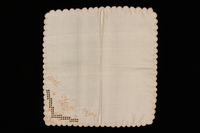
Peach silk handkerchief hand embroidered with ribbons and flowers brought to the US by a Jewish family fleeing German occupied Poland
Object
Peach silk handkerchief with embroidered ribbons and flowers that Nadzieja Klein took with her when she, her husband, Jerzy, 3 year old daughter, Joanna, and her aunt, Elizawieta Palcew, escaped Warsaw, Poland, after living under German occupation since September 1939. Jerzy had applied for US visas in 1936 following Hitler’s remilitarization of the Rhineland, but was unsuccessful because of restrictive US entry quotas. Jerzy acquired false travel papers for roundtrip travel to Peru via Italy. The family traveled by train to Trieste where they obtained transit permits through Yugoslavia and Greece to Turkey. Up to this point, they had been accompanied by Nadzieja’s brother, wife, and child. But in Istanbul, Nadzieja’s family obtained US visas, valid for 3 months; her brother’s family had not applied previously and continued onto Palestine. Jerzy Klein's family and Elizawieta Palcew were evacuated by the British by train to Baghdad, and then Basra, in Iraq. From there, they sailed to Karachi and Bombay (Mumbai), India, where, in January 1941, they boarded an American cruise liner, the USS President Harrison, and arrived in New York on February 17.
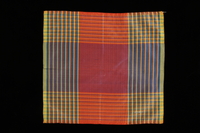
Iridescent plaid silk taffeta handkerchief brought to the US by a Jewish family fleeing German occupied Poland
Object
Iridescent plaid silk taffeta handkerchief that Nadzieja Klein took with her when she, her husband, Jerzy, 3 year old daughter, Joanna, and her aunt, Elizawieta Palcew, escaped Warsaw, Poland, after living under German occupation since September 1939. Jerzy had applied for US visas in 1936 following Hitler’s remilitarization of the Rhineland, but was unsuccessful because of restrictive US entry quotas. Jerzy acquired false travel papers for roundtrip travel to Peru via Italy. The family traveled by train to Trieste where they obtained transit permits through Yugoslavia and Greece to Turkey. Up to this point, they had been accompanied by Nadzieja’s brother, wife, and child. But in Istanbul, Nadzieja’s family obtained US visas, valid for 3 months; her brother’s family had not applied previously and continued onto Palestine. Jerzy Klein's family and Elizawieta Palcew were evacuated by the British by train to Baghdad, and then Basra, in Iraq. From there, they sailed to Karachi and Bombay (Mumbai), India, where, in January 1941, they boarded an American cruise liner, the USS President Harrison, and arrived in New York on February 17.
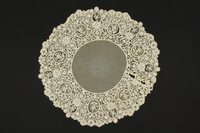
Doily with floral lace border brought to the US by a Jewish family fleeing German occupied Poland
Object
Large floral lace doily that Nadzieja Klein took with her when she, her husband, Jerzy, 3 year old daughter, Joanna, and her aunt, Elizawieta Palcew, escaped Warsaw, Poland, after living under German occupation since September 1939. Jerzy had applied for US visas in 1936 following Hitler’s remilitarization of the Rhineland, but was unsuccessful because of restrictive US entry quotas. Jerzy acquired false travel papers for roundtrip travel to Peru via Italy. The family traveled by train to Trieste where they obtained transit permits through Yugoslavia and Greece to Turkey. Up to this point, they had been accompanied by Nadzieja’s brother, wife, and child. But in Istanbul, Nadzieja’s family obtained US visas, valid for 3 months; her brother’s family had not applied previously and continued onto Palestine. Jerzy Klein's family and Elizawieta Palcew were evacuated by the British by train to Baghdad, and then Basra, in Iraq. From there, they sailed to Karachi and Bombay (Mumbai), India, where, in January 1941, they boarded an American cruise liner, the USS President Harrison, and arrived in New York on February 17.
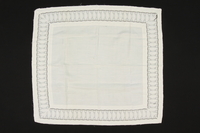
White square cotton pillowcase with a cutwork border brought to the US by a Jewish family fleeing German occupied Poland
Object
White pillowcase with a monogram and cutwork border from her 1926 bridal trousseau that Nadzieja Klein took with her when she, her husband, Jerzy, 3 year old daughter, Joanna, and her aunt, Elizawieta Palcew, escaped Warsaw, Poland, after living under German occupation since September 1939. Jerzy had applied for US visas in 1936 following Hitler’s remilitarization of the Rhineland, but was unsuccessful because of restrictive US entry quotas. Jerzy acquired false travel papers for roundtrip travel to Peru via Italy. The family traveled by train to Trieste where they obtained transit permits through Yugoslavia and Greece to Turkey. Up to this point, they had been accompanied by Nadzieja’s brother, wife, and child. But in Istanbul, Nadzieja’s family obtained US visas, valid for 3 months; her brother’s family had not applied previously and continued onto Palestine. Jerzy Klein's family and Elizawieta Palcew were evacuated by the British by train to Baghdad, and then Basra, in Iraq. From there, they sailed to Karachi and Bombay (Mumbai), India, where, in January 1941, they boarded an American cruise liner, the USS President Harrison, and arrived in New York on February 17.
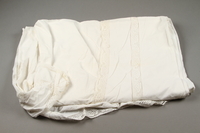
Duvet cover
Object
Duvet cover which was part of Nadzieja Klein's [later Nadine Kent] wedding trousseau.
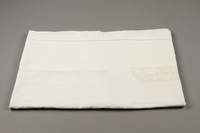
Linen tablecloth
Object
Linen tablecloth that formed part of Nadzieja Klein's [later Nadine Kent] wedding trousseau.
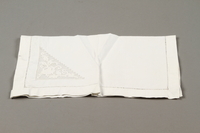
Set of linen napkins
Object
Set of linen napkins which were part of Nadzieja Klein's [later Nadine Kent] wedding trousseau.
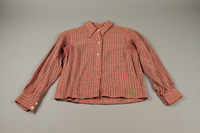
Ski outfit
Object
3 piece ski outfit, part of WWII clothing that belonged to Nadzieja Klein (later Nadine Kent) [donor's mother]
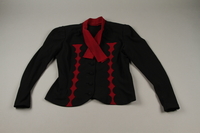
Jacket
Object
Custom-tailored wool jacket, part of WWII clothing that belonged to Nadzieja Klein (later Nadine Kent).
Coat
Object
Man's overcoat worn by Jerzy Klein (later George Kent) [donor's father] and brought with him from Warsaw to the United States via Iraq and India.



